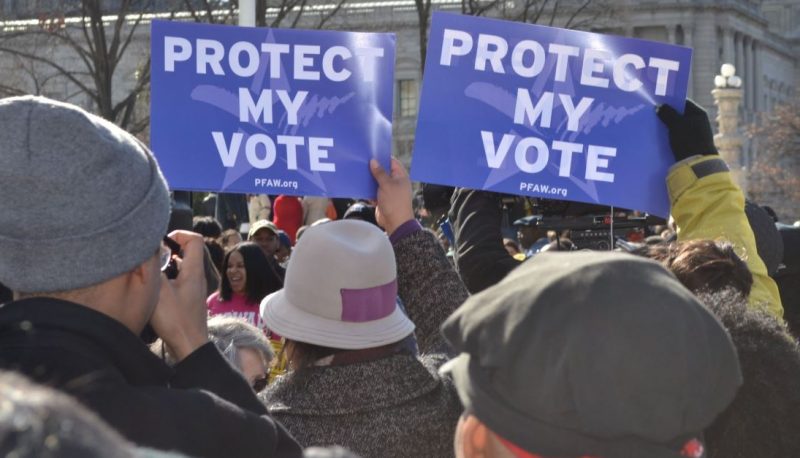“Confirmed Judges, Confirmed Fears” is a blog series documenting the harmful impact of President Trump’s judges on Americans’ rights and liberties. Cases in the series can be found by issue and by judge at this link
Trump Sixth Circuit Judge Chad Readler cast the deciding vote to vacate a district court’s preliminary injunction and put back in place a Tennessee law that prevents some first-time voters from voting by mail. The June 2021 decision was in Memphis A. Philip Randolph Institute v Hargett.
Tennessee law forbids a first-time voter who has registered by mail or online from voting by mail. This is true even if they otherwise meet the criteria for absentee voting, such as being away from home on election day, over 60 years old, hospitalized or ill or, as the state explained before the 2020 election, with “special vulnerability” to COVID-19 or serving as a caretaker for such a person. Several organizations and individuals filed suit in May 2020, and a district court granted a preliminary injunction against the law, which was therefore not in effect during last November’s election. The state continued to pursue its appeal.
In a 2-1 ruling in which Trump judge Readler was the deciding vote, the Sixth Circuit vacated the injunction and ordered that the law should go back into effect for future elections unless there is a future order against it. According to the majority, the standing of the plaintiffs to sue in the case rested on the situation of one NAACP member, a Tennessee college student who had relocated out of state and studied on-line due to COVID-19. The student had recently transferred to a college in Memphis, so the majority claimed there is “no longer” a need for him to vote absentee and the case is moot, and the possibility that he may be sick or away during the next election is just ‘speculation” that cannot support any “actual ongoing stake in the litigation.” The majority thus vacated the preliminary injunction and sent the case back to the district court.
Trump judge Readler also claimed, in a concurring opinion, that on the merits, the Tennessee law “easily passes constitutional muster.” According to Readler, this is because the law imposes only a “minimal burden” since a person can easily register to vote in person and avoid it, and because of the state’s interest in “effectuating its electoral system” in compliance with the law.
Judge Karen Nelson Moore strongly dissented. She explained that the majority ruling “misapplies our mootness jurisprudence” and “closes its eyes to the myriad election cases that we have held to fall within the rule for controversies that are ‘capable of repetition, yet evading review.’” Under that established doctrine, Moore continued, even where later events (like the student moving back to Tennessee) appear to have made the controversy moot, the court should proceed with the case where there is a “reasonable expectation” that the same problem will occur again. In this case, Moore wrote, this standard is clearly met, because the actual party in the case, the Tennessee NAACP, has “over 10,000 members” and there is certainly a “reasonable expectation” that “this controversy will recur with respect to a Tennessee NAACP member” concerning a future election. As she pointed out, when a group like the NAACP is the plaintiff, “our caselaw rejects the proposition” that a case like this becomes moot based on the situation of one particular member when there is a “reasonable expectation,” as the record shows here, that the problem will recur concerning other members. Even with respect to the individual NAACP student member in this case, Moore noted, while the “speculation” about his future plans could not support standing to bring a new suit, the Supreme Court has specifically noted that even such “speculative” possibilities can “overcome mootness.”
With respect to the merits of the case, Moore explained why the burden imposed by the law was more than minimal, contrary to Readler’s view. That position is “effectively foreclosed by the court’s precedent,” she wrote, because the Sixth Circuit had previously ruled that a voter can establish more than a minimal burden if, as a result of the challenged law, there are “few alternate means of access to the ballot.” That was clearly the case here, Moore went on, with respect to first-time voters who are absent from their home precinct or otherwise “would have great difficulty” in registering in person, contrary to Readler’s cavalier suggestion. Moore also pointed out that putting the voting system into effect in compliance with federal law “does not require first-time voters who registered to vote by mail to vote in person the first time they vote.” In short, Moore concluded, the district court was correct to order “preliminary relief” and there was no good reason to vacate its injunction.
As a result of Trump judge Readler’s deciding vote, however, the preliminary injunction against the state’s harmful voting restriction has been dissolved, and it is uncertain at best whether the law will be in effect at the next election. The decision underlines the importance to our fight for our courts of promptly confirming Biden nominees to the Sixth Circuit and elsewhere who will truly respect the right to vote and the laws that help protect it.

